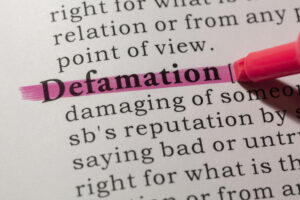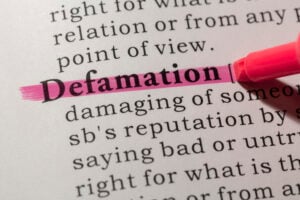 In all the hubbub surrounding the Fox News trial, people rarely mention that Dominion Voting Systems is originally a Canadian company. While it now has a second headquarters in the United States, no one really talks about it as a foreign company. Well, some people at Fox News talked about it being a Venezuelan company and that’s why we’ve arrived at this trial, but in reality, Dominion has Canadian roots.
In all the hubbub surrounding the Fox News trial, people rarely mention that Dominion Voting Systems is originally a Canadian company. While it now has a second headquarters in the United States, no one really talks about it as a foreign company. Well, some people at Fox News talked about it being a Venezuelan company and that’s why we’ve arrived at this trial, but in reality, Dominion has Canadian roots.
Which might make you wonder why Dominion chose to pursue Fox in the United States. After all, Canada doesn’t have a corollary to NYT v. Sullivan, meaning the company wouldn’t have to go to the trouble of demonstrating actual malice in securing a defamation verdict — or scaring the company into settling to avoid one as the case may be. On the other hand, the damage to Dominion’s business was done in the United States and, as it turns out, the U.S. refuses to honor defamation judgments secured in Canada. Apparently, no matter how much conservatives hate the Sullivan standard, they hate any jurisdiction without it a little bit more. So if Dominion ever wanted to see any money for its troubles, it needed to be prepared to overcome the actual malice hump here and they had to have confidence that discovery would uncover mounds of evidence that folks knew about the falsehoods in real time.
Based on how everything turned out, it looks like they did a decent job of it.
A mirror image of the Dominion case currently sits in federal court in D.C. This time it’s a plaintiff focusing its work in the U.S. suing a Canadian media company. WE Charity v. Canadian Broadcasting Company, 22-00340-RDM involves an international charity with an increasingly American presence and the primary media entity of Canada. WE began as a Canadian-based charity, but has moved to where the resources are, incorporating in New York and embracing the United States donor class. It turns out that events with Selena Gomez and Michelle Obama generate more buzz than events hosted by Don Cherry at the local Tim Horton’s. That said, the entity’s Canadian roots have kept WE a fixture of the northern media landscape.
A CBC show called The Fifth Estate decided to pursue an exposé of WE’s efforts across the world and accused the charity of lying about the extent of its charitable efforts in Africa. WE built schools in Africa, CBC said they couldn’t find all the schools, WE delivered evidence of all the schools, CBC… kept reporting that the schools weren’t there. According to the complaint, the CBC might have had reason to know — or outright knowledge — that they might be making stuff up:
For example, email correspondence shows that from the outset of its reporting, WE Charity consistently told the CBC that it funded 852 schoolrooms in Kenya—not 360, as the CBC reported. WE Charity’s count did not fit the CBC’s narrative about “missing” schools, so the CBC falsely claimed that WE Charity counted latrines as schools to discredit the charity’s figures. Multiple emails with the CBC’s reporters show they knew that was not true. WE Charity even gave the CBC photographs of every one of the 852 schoolrooms—none were latrines. Then, in an interview, the CBC’s reporter asked a WE Charity representative to confirm that the 852 figure, “doesn’t include latrines,” and she confirmed latrines were not counted. The CBC cut this exchange. Instead, in the broadcast interview, after WE Charity’s representative says the charity funded 852 schoolrooms, the CBC cuts to a voiceover saying this figure included “even latrines, which inflated the total count.”
CUTS TO A VOICEOVER! That’s just so bush league. Even if the CBC believed they were telling the truth, editing a show this way should have at least raised every viewer’s hackles. It’s actually terrifying that either country has such widespread media literacy problems that this didn’t raise every red flag in the book.
Email correspondence shows that prior to its visit to Kenya, the CBC knew it needed Kenyan government permission to film at WE Charity- funded schools, which are run by the government. But the CBC didn’t get permission (despite telling WE Charity that it had done so). Kenyan government officials have since confirmed, “There is no record of the Ministry of Education issuing permission to the Canadian Broadcasting Corporation to film in schools in September 2021.” Not surprisingly, in the middle of a global pandemic, the CBC’s film crews were denied access to school grounds without permission. The CBC never told the public any of this, instead feigning surprise: “we were told we couldn’t come in, which we found to be kind of odd.”
When I say this is the mirror image of the Dominion case, it really is a mirror image all the way down. “Which we found to be kind of odd,” reads like a Trump/Fox News refrain — “we asked how many fake ballots they cast and the poll workers didn’t know of any, which we found to be kind of odd.” It’s the same tropes lifted from the election and plopped onto a charity. Opinion is protected speech, of course, but it ceases to be opinion after the speaker knows it’s not factually true. If this timeline is accurate, this would be defamation gussied up with some opinion-colored lipstick.
Honestly, the WE Charity complaint is over 200 pages long and includes a litany of allegations like these. The CBC is trying to get the case moved back to Canada, likely because they don’t think “actual malice” is providing them much protection here. WE seems committed to staying in the U.S. so its donors get a front row seat to its exoneration.
Which forms the most important link between both actual malice cases. There was a little media hand-wringing over the Dominion case that it could become a vehicle to strike down Sullivan and open the floodgates to bad faith actors trying to harass media into silence. As it happens, that case was solid with or without an actual malice standard. But both WE and Dominion eschewed heading to Canada even if it might be the path of least resistance because navigating the tougher legal standard is less important than the value of the American process.
Because some defamation plaintiffs are looking for damages, but both Dominion and WE aren’t going to be made whole by an award as much as the message that would be conveyed by winning in the United States. Dominion and WE are both looking to assure local governments and donors respectively that they can still be trusted. When most if not all of those constituents are in the U.S., then actual malice isn’t an obstacle. Dominion managed to secure its vindication. WE is still waiting to see if the case remains in the United States.
But when the networks leave paper trails like these… actual malice doesn’t seem like much more than a speedbump.
 Joe Patrice is a senior editor at Above the Law and co-host of Thinking Like A Lawyer. Feel free to email any tips, questions, or comments. Follow him on Twitter if you’re interested in law, politics, and a healthy dose of college sports news. Joe also serves as a Managing Director at RPN Executive Search.
Joe Patrice is a senior editor at Above the Law and co-host of Thinking Like A Lawyer. Feel free to email any tips, questions, or comments. Follow him on Twitter if you’re interested in law, politics, and a healthy dose of college sports news. Joe also serves as a Managing Director at RPN Executive Search.



